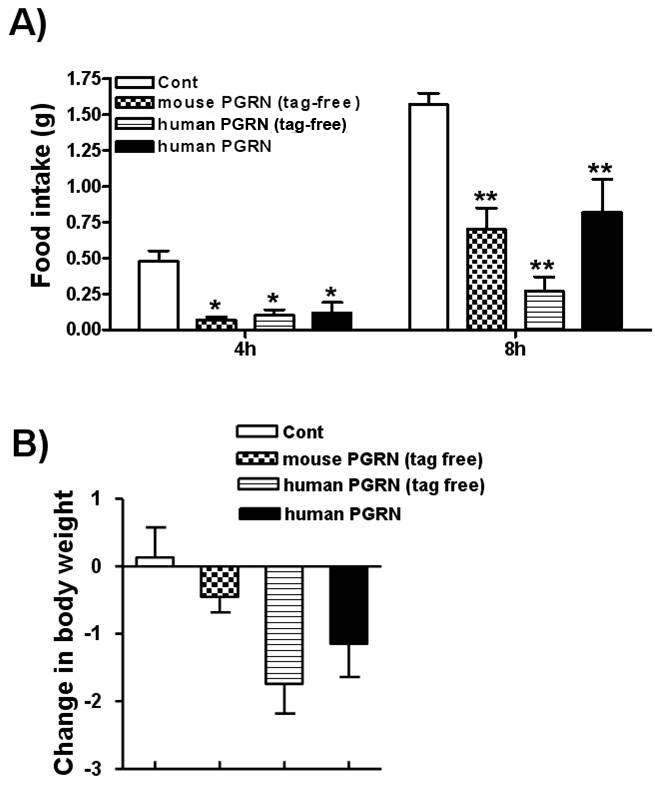Progranulin (human) (rec.) (untagged)
| Code | Size | Price |
|---|
| AG-40A-0188Y-C010 | 10 ug | £180.00 |
Quantity:
| AG-40A-0188Y-C050 | 50 ug | £420.00 |
Quantity:
Prices exclude any Taxes / VAT
Overview
Host Type: Human
Regulatory Status: RUO
Target Species: Human
Shipping:
Blue Ice
Storage:
-20°C
Images
Documents
Further Information
Alternate Names/Synonyms:
Proepithelin; PEPI; PC Cell-derived Growth Factor
Biological Activity:
Activates phospho-ERK1/2 in neuronal mouse P19 cells. Regulates food intake and body weight (see reference 1).
Concentration:
After reconstitution:for 10µg size: 0.1mg/mlfor 50µg size: 1 mg/ml
EClass:
32160000
Endotoxin:
<0.01EU/µg purified protein (LAL test; Lonza).
Form (Short):
liquid
Formulation:
Lyophilized. Contains PBS.
Handling Advice:
After reconstitution, prepare aliquots and store at -20°C.Avoid freeze/thaw cycles.Centrifuge lyophilized vial before opening and reconstitution.PBS containing at least 0.1% BSA should be used for further dilutions.
Long Description:
Protein. Signal peptide and human progranulin (aa 1-593) is untagged. Reflects the native sequence with no additional aa. Source: HEK 293 cells. Endotoxin content: <0.01EU/µg purified protein (LAL test; Lonza). Lyophilized. Contains PBS. Purity: >98% (SDS-PAGE). Progranulin (PGRN) is a widely expressed pluripotent growth factor which plays a role in processes such as development, wound repair and inflammation by activating signaling cascades that control cell cycle progression and cell motility. Its function in the central nervous system is of interest, as mutations in the PGRN gene were found in cases of frontotemporal degeneration (FTLD). In addition, PGRN has also been linked to tumorigenesis. Progranulin is a biomarker for FTLD, other types of Alzheimer's Disease (AD) and potentially for MCI (Mild Cognitive Impairment). Additionally, PGRN is described as a new ligand of TNF receptors and a potential therapeutic against inflammatory disease like arthritis.
Molecular Weight:
~74kDa (glycosylated protein by SDS-PAGE)
NCBI, Uniprot Number:
P28799
Package Type:
Plastic Vial
Product Description:
Progranulin (PGRN) is a widely expressed pluripotent growth factor which plays a role in processes such as development, wound repair and inflammation by activating signaling cascades that control cell cycle progression and cell motility. Its function in the central nervous system is of interest, as mutations in the PGRN gene were found in cases of frontotemporal degeneration (FTLD). In addition, PGRN has also been linked to tumorigenesis. Progranulin is a biomarker for FTLD, other types of Alzheimer's Disease (AD) and potentially for MCI (Mild Cognitive Impairment). Additionally, PGRN is described as a new ligand of TNF receptors and a potential therapeutic against inflammatory disease like arthritis. EphA2, a member of the large family of Ephrin receptor tyrosine kinases, is also a functional signaling receptor for progranulin as reported recently.
Purity:
>98% (SDS-PAGE)
Sequence:
Signal peptide and human progranulin (aa 1-593) is untagged. Reflects the native sequence with no additional aa.
Source / Host:
HEK 293 cells
TAGs:
no TAG
Transportation:
Non-hazardous
UNSPSC Category:
Other Proteins
UNSPSC Number:
12352202
Use & Stability:
Stable for at least 6 months after receipt when stored at -20°C. Working aliquots are stable for up to 3 months when stored at -20°C.
References
Involvement of Progranulin in Hypothalamic Glucose Sensing and Feeding Regulation: H.K. Kim, et al.; Endocrinology 152, 4672 (2011) | Progranulin directly binds to the CRD2 and CRD3 of TNFR extracellular domains: J. Jian, et al.; FEBS Lett. 587, 3428 (2013) | Progranulin and a five transmembrane domain-containing receptor-like gene are the key components in receptor activator of nuclear factor B (RANK)-dependent formation of multinucleated osteoclasts: J. Oh, et al.; J. Biol. Chem. 290, 2042 (2015) | New discovery rarely runs smooth: an update on progranulin/TNFR interactions: B.C. Wang, et al.; Protein Cell 6, 792 (2015) | Progranulin regulates lysosomal function and biogenesis through acidification of lysosomes: Y. Tanaka, et al.; Hum. Mol. Genet. 26, 969 (2017)
Related Products
| Product Name | Product Code | Supplier | Progranulin (human) (rec.) | AG-40A-0068Y | AdipoGen Life Sciences | Summary Details | |||||||||||||||||||||||||||||||||||||||||||||||||||||||||||||||||||||||||||||||||||||||||||||
|---|---|---|---|---|---|---|---|---|---|---|---|---|---|---|---|---|---|---|---|---|---|---|---|---|---|---|---|---|---|---|---|---|---|---|---|---|---|---|---|---|---|---|---|---|---|---|---|---|---|---|---|---|---|---|---|---|---|---|---|---|---|---|---|---|---|---|---|---|---|---|---|---|---|---|---|---|---|---|---|---|---|---|---|---|---|---|---|---|---|---|---|---|---|---|---|---|---|---|---|
| Progranulin (mouse) (rec.) (untagged) | AG-40A-0189Y | AdipoGen Life Sciences | Summary Details | ||||||||||||||||||||||||||||||||||||||||||||||||||||||||||||||||||||||||||||||||||||||||||||||||
| Progranulin (rat) (rec.) (untagged) | AG-40A-0196Y | AdipoGen Life Sciences | Summary Details | ||||||||||||||||||||||||||||||||||||||||||||||||||||||||||||||||||||||||||||||||||||||||||||||||



